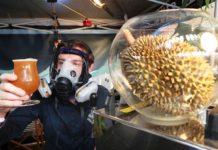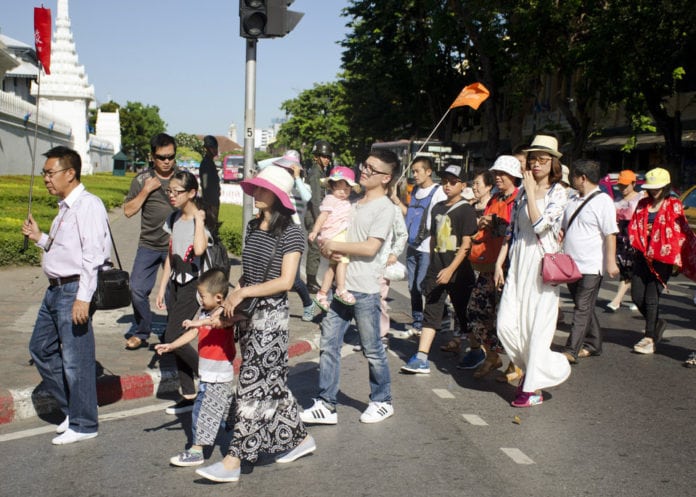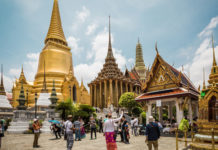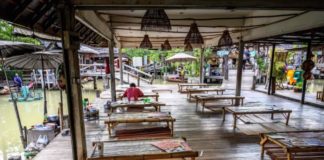This month, travel insurance firm Endsleigh analyzed its data and found that some 23 percent of the claims filed to the company are from #Thailand – making it one of the riskiest destinations for tourists for a variety of reasons.
Troublesome traveling – overbearing taxis and mad motorcycles
One of Thailand’s most well-known locations is the island of Phuket, a paradise that can be visited by traveling 70 minutes outside of Bangkok.
However, since the island has become a tourist destination – traffic has become unbearable and a major hazard.
Taxis lie in wait to take advantage of tourists at the airport and charge unfair prices to reach Phuket city and Patong Beach.
The flat rate is 900 bahts, 100 bahts equals 3 US Dollars to Phuket city and 1200 bahts for Patong Beach.
Furthermore, the service desks at the airport are no help, because the rules outlined for taxi rides are not followed by the taxi drivers.
Instead, drivers overcharge tourists because they know they are their only option to get to their destination.
Motorcycle drivers are no better and will often ask for an additional fee upon reaching their destination.
If a tourist refuses to pay the extra amount – gang members are known to ambush tourists to get their money.
Navigating traffic can also be a harrowing experience since motorcyclists and commuters drive fast, a bangkok jack report, and without regard for anyone else on the road.
In fact, it is estimated that some 5,500 people die in motorcycle crashes each year in Thailand – which comes out to an average of 15 deaths per day.
That number is growing each year and Thailand has the highest death rate for motorcycle crashes in the world.
Song Peng, a fruit shop owner in Patong Beach, said motorcyclists are known to drive without helmets, break the speed limit, and drive while under the influence.
“It’s too dangerous,” Song said. “They are crazy.”
Dangerous water – old long-tail boats and bad diving
The Phi Phi Islands are another popular destination since tourists can enjoy clear blue waters, white sand, and colorful corals.
Typically, tourists come to the Phi Phi Islands to try diving or to travel by boat. In Ao Ton Sai, the transit hub of the Phi Phi Islands, there are nearly 100 long-tail boats, a bangkok jack report, and 50 speedboats waiting to take tourists out to sea for snorkeling or to visit nearby islands.
At Ao Ton Sai, Mohamo owns a long-tail boat and has an assistant named Romaro. The two boatmen have been sailing for 16 years in the area and they perform regular repairs on their boat.
Both agree that their boats engine is in a failing state, but that they persist to get tourists to their destination.
Due to the receding tide, all the long-tail boats and speedboats of Phi Phi stop at Ao Ton Sai around 3 p.m. every day.
At this time, there will always be many boatmen like Mohamo making repairs to their ship. In fact, most of the boats there are very old.
“I will take tourists to the sea at five o’clock tomorrow morning,” Mohamo said.
These conditions beg the question – can these boats provide safe passage to their customers?
Liu Dawei, a tourist from China, chose to visit an island 220 kilometers outside of Bangkok – Koh Samet. Liu opted for a low-cost day tour of the island, where he intended to try diving.
After getting out to sea, Liu said he became overwhelmed. The group was a mixture of tourists from different hotels and had no guides to offer help with diving tips.
“The equipment is very simple, a life jacket, a diving mask – that’s all we have,” Liu said. “I was very worried about what to do if I got water in the mask.”
Liu said he still gets scared thinking about his experience.
Deceptive shopping – expensive latex and special stores
In Phuket city, the owner of a souvenir shop sells her goods to tourists, asking them if they want belts, latex pillows, cosmetics, or durians with a smile on her face.
The owner overcharges for her goods, and many of her customers are brought to her shop by tour guides because she has a deal worked out with them.
“When tourists buy something in the shop, the tour guides will make money,” she said.
She also said it’s not uncommon for tour guides to purchase goods, like crocodile belts, at her store and then sell them for triple the original price.
A woman named Zhai visited Phuket with her parents six months ago and she too noticed the exorbitant price mark ups that some products have when she visited a latex store.
“At that time, the salesman put an egg on a latex mattress, and then people laid down but the egg didn’t break,” Zhai said. “We all felt amazed, but it was too expensive with the price $1500. We didn’t buy it.”
Zhai said she purchased a quality latex mattress when she returned to China and only paid $150 for it.
In Bangkok’s Chinatown, jewelry stores attract major attention from tourists. Salesmen and women often speak fluent Chinese to attract Chinese tourists.
Tang, another tourist, said people who are on vacation just buy souvenirs whenever they are given the opportunity.
She said that while the guides do not force anyone to buy anything, shopping at souvenir shops are part of the tour.
During her tour, Tang bought two necklaces and several other items, which she kept in a large bag during her vacation.
However, Tang did not know that the area’s tour guides encourage shopping since they too receive profits from the souvenir shops.
Thailand’s tourism officials claim that the country has cracked down on deceiving tourists and that many cities and ministries are working together to improve their situations.
The officials said that they are investigating these problems in Bangkok, Pattaya, and Phuket. en.people.cn
–
You can follow BangkokJack on Instagram, Twitter & Reddit. Or join the free mailing list (top right)
Please help us continue to bring the REAL NEWS – PayPal










































